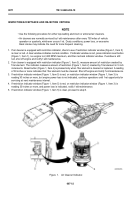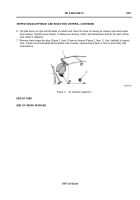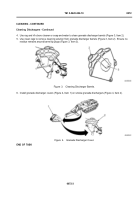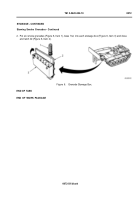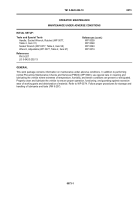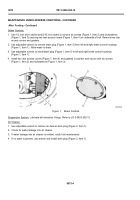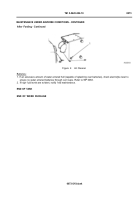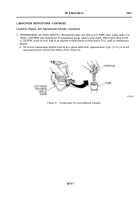TM-5-5420-202-10 - Page 465 of 535
TM 5-5420-202-10
0073
Highly Humid or Salty Atmosphere
Typical Problems in Very Humid or Salty Atmosphere: Corrosive action will occur on all parts that are not properly
protected. Evidence of corrosion appears as rust and paint blisters on metal parts, and mildew, mold, or fungus
growth on wood, fabrics, or leather. Humid and salty atmospheres have a tendency to deteriorate oil and grease
and destroy their rust-preventive qualities.
Metal Surfaces: Remove corrosion from exterior metal surfaces with abrasive paper and apply a protective coating
of paint, oil, or suitable rust preventive as required.
Canvas Covers: Clean and dry canvas often to prevent mildew.
Magnesium and Aluminum Parts: Clean all magnesium and aluminum parts and wipe dry to prevent corrosion.
Sand, Dust, or Mud
Typical Problems in Sand, Dust, or Mud: Painted surfaces and sighting optical parts, if not covered, become etched
by sand. Lubricants and fuels become contaminated. Service life of air cleaners and f lters is shortened.
Sighting Equipment: Keep exposed optical surfaces protected as much as possible to prevent etching by sand
or dust.
Engine and Engine Compartment: Clean engine compartment and engine as often as required to prevent
accumulation of sand, dust, or mud. Cover engine compartment grilles when parked.
After Fording
General: The following services should be performed on vehicle after fording, especially in saltwater. Perform these
services, as soon as tactical situation permits, to halt deterioration and avoid damage before the vehicle is driven
extensively in regular service. Heat generated by moving parts during operation of vehicle will evaporate or force
out most of the water that may have entered at various points. Any small amount of water that has entered the
engine crankcase due to leakage or condensation will usually be evaporated and passed by the ventilating system.
Hull:
1. Open drain valves and allow all water to drain. Refer to WP 0009.
2. If fording was in saltwater, wash all traces of saltwater and salt deposits from vehicle.
3. Clean, dry, and lubricate all exposed surfaces that will affect operation or deterioration due to exposure to
water.
Engine, Transmission, and Final Drives: Inspect engine, transmission, and f
in
al drive oil for contamination. If
evidence of contamination is found, notify f eld maintenance.
0073-3
MAINTENANCE UNDER ADVERSE CONDITIONS - CONTINUED
Back to Top

